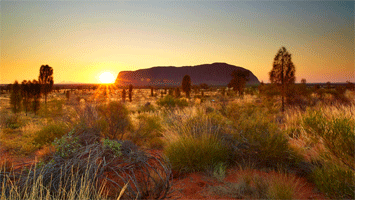|
|
|
|
|
|
|
Day 9
Early Morning: Rise early this morning to witness Uluru in the light of dawn, a dramatic sight seen by far fewer travelers than at sunset. Breakfast: Served at the hotel featuring hot and cold dishes beginning at 6am. Morning: Around 9am, we’ll depart the hotel by motorcoach to discover Kata Tjuta National Park. While Uluru is the centerpiece of Kata Tjuta, the park also includes the spectacular rock formations nearby called the Kata Tjuta. Our Trip Experience Leader will give us more insight into the spiritual symbolism of this natural wonder and the history of the indigenous people's rights to the land. Following our guided tour, we will drive back to the hotel, departing around 11:15am. Lunch: We’ll arrive back in Yulara around 12pm and get a "take-away" lunch from the Kulata Academy Café, an establishment that employs young indigenous people as trainees to prepare them for a career in the hospitality industry. Afternoon: After lunch, we’ll walk 5 minutes back to our hotel to enjoy a few hours of leisure time to settle in or explore on your own. We’ll then reconvene in the hotel lobby around 4:30pm to board our private motorcoach and drive 15-minutes to a sunset viewing area. Here, we’ll enjoy a traditional sunset toast as the last daylight paints the massive monolith of Uluru into a kaleidoscope of colors. Our private guide will lead our small group around areas of the base of the massive sandstone monolith that are rarely visited by tourists. As we explore, our guide will point out the effects of millions of years of erosion by rain and wind. Early European settlers named it Ayers Rock, but it is called Uluru by the Anangu indigenous people who serve as its spiritual caretakers. In spite of—perhaps even in defiance of—the negative effects of European settlement, some 50,000 years of Australian indigenous culture and spirit have strongly endured in art, dance, and music. Uluru is the most fitting symbol of that endurance. The local Anangu people attach paramount spiritual significance to Uluru. As the Outback sun descends on the monolith (whose red-orange hue shifts fluidly throughout the day) the rock seems to glow eerily, as if lit from within. For centuries, people have felt the ancient spirituality of Uluru. The Anangu consider Uluru a literal giver of life as it attracts animals in abundance to its waterhole and provides shelter and firewood to visitors. All in one rugged place and where one might freely describe it as "the middle of nowhere," you can find a variety of life prospering. This viewing will provide us with a deeper understanding of the indigenous heritage that runs deep in this land and all of Australia. During our explorations, our local Trip Experience Leader will put things into perspective and help us understand the connection the indigenous people have to this sacred site. Much of the area around Uluru is open for public visitation, but parts of this site are still so important to the Anangu that they remain off-limits. After our sunset viewing, we will drive back to the hotel. Dinner: On your own—you may choose to venture out in search of a traditional restaurant. Or, you may dine in the hotel's restaurant, which features dishes that showcase indigenous flavors, like native spices, seeds, grains, and fresh local produce. Your Trip Experience Leader will provide recommendations for some of his or her favorite local spots. Evening: Your evening is free to walk the hotel grounds or take advantage of its amenities. |
|
|
|
|
|||
|
5/14/23 |
|||
|
|
|
|
|
 Meals
included: B L
Meals
included: B L